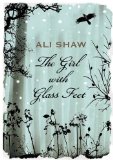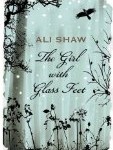 Short Listed for Costa First Novel Award 2009
Short Listed for Costa First Novel Award 2009
The Girl with Glass Feet was Simon’s choice for Not the TV Book Group (an online book group formed recentlyby several UK book bloggers).
The book is set on a strange island, packed with weird animals; the plot centring on a woman called Ida, who discovers that she is slowly turning to glass.
The only word I can use to describe this book is bizarre! I’m afraid that I didn’t really understand the point of this book and the implausibility just seemed to grate on me rather than entertain.
Ida’s toes have turned to glass and she notices that the glass is spreading up her feet, but we have no explanation as to why this is occurring. There is no wicked witch to hate, or cursed place to avoid – it has just happened and Ida seems to accept it. She has a relationship with a man called Midas, but their relationship lacked emotion and I found that I didn’t really care what happened to them. I felt distanced from all the characters, never really understanding what motivated them to do anything.
The book also contained ‘bull moths’ – tiny cows with wings. Why?!! I just didn’t understand. Cows are ugly, muddy things and miniaturising them doesn’t make them cute. I can’t imagine one flying and couldn’t understand why they were present in the book.
Overall I found this to be a very frustrating book. Little was explained or tied up nicely at the end – it was just one bizarre event after another. I prefer stories based in reality, or at least with enough detail to immerse yourself in the strange new world.
Lots of other people enjoyed it though, so head over to Simon’s blog to read the fantastic discussion in the comments section.
Did you enjoy The Girl with Glass Feet?
Can you accept bizarre occurrences in books, or do you need a plausible explanation?


